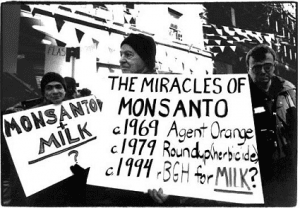 A California judge has indicated that lawsuits against Monsanto’s Roundup in his court may be difficult to pursue. The federal judge dealt a potential death blow to a lawsuit claiming Roundup causes cancer when he concluded last week that the plaintiff’s experts’ testimony against Roundup is “shaky.” The case, as well as hundreds of others filed in the federal MDL, now stands in danger of not getting to trial.
A California judge has indicated that lawsuits against Monsanto’s Roundup in his court may be difficult to pursue. The federal judge dealt a potential death blow to a lawsuit claiming Roundup causes cancer when he concluded last week that the plaintiff’s experts’ testimony against Roundup is “shaky.” The case, as well as hundreds of others filed in the federal MDL, now stands in danger of not getting to trial.First Judge to Opine on Roundup Toxicity
U.S. District Judge Vince Chhabria is the first judge to opine on the toxicity of Roundup, the world’s most popular herbicide. Roundup has been the center of controversy for more than 30 years, since the U.S. EPA bent its own rules and regulation to allow it on the market. The judge has indicated he may cut several or all of the plaintiff’s key witnesses, which could make the case impossible to pursue in his court. Such a move could also profoundly impact the outcome of more than 300 Monsanto lawsuits in his federal court, suits trying to hold Monsanto liable for failing to warn about Roundup’s cancer risks.
Chhabria heard from about a dozen witnesses including toxicologists, statisticians, and an oncologist. He took special interest in two epidemiologists who study how humans contract disease.
Chhabria said on March 14 that he has a “difficult time understanding how an epidemiologist in the face of all the evidence that we saw and heard last week can conclude that glyphosate is in fact causing non-Hodgkin’s lymphoma in human beings.” The judge called the evidence that glyphosate is currently causing NHL in human beings “pretty sparse.” The judge was apparently impressed by all the Monsanto-sponsored studies the chemical giant had submitted earlier to exonerate glyphosate.
The judge appears to have supported Monsanto’s policy of only testing for the safety of glyphosate, instead of the entire chemical formulation of Roundup, of which glyphosate is only one of the chemical ingredients, which experts estimate to be 1,000 times more toxic than glyphosate alone, due to the interactions of the stabilizers, leaf adherents, and other chemicals with glyphosate in the Roundup formula. Glyphosate is never applied alone, only as part of the chemical mix in Roundup.
Reuters reported that it remains to be seen which witnesses the judge will allow to testify at trial on behalf of more than 700 farmers, landscapers and gardeners. All claim that exposure to glyphosate – through skin contact or inhalation — caused their non-Hodgkin’s lymphoma.
Judge Chhabria appeared to give some credit to Beate Ritz, a public health professor at the University of California at Los Angeles, for having conducted independent analysis. Still, he called Ms. Ritz’ conclusion that glyphosate causes NHL in humans “dubious.” He indicated she might be the only witness he allows to testify for the plaintiffs, but even she is at risk of elimination.
Why Not Let a Jury Decide?
Monsanto isn’t completely off the hook, based on what Chhabria said last week. At this stage he is acting as a gatekeeper to exclude evidence not backed by what he calls scientific rigor, or to at least give the appearance that he is doing so. His position allows him to decide which witnesses are qualified as “experts” who can present their conclusions to a jury. Chhabria said his role is to decide whether the testimony is “in the range of reasonableness,” not whether glyphosate causes cancer. Why not let a jury decide?
Chhabria also termed the epidemiology for Roundup causing cancer as “loosey-goosey” and called it a “highly subjective field.” (Isn’t that what trials are for?) But Chhabria may not be able to ride roughshod over all the plaintiffs’ cases. Some constraints for eliminating witnesses may leave the plaintiffs’ room for Ritz to testify, he conceded. Maybe Ritz “is operating within the mainstream of the field,” he said. “Maybe that means it’s up for the jury to decide if they buy her presentation.”
The judge noted that Ritz was the only plaintiff’s expert not to rely on a 2015 determination that glyphosate is a probable human carcinogen by the International Agency for Research on Cancer, an arm of the World Health Organization. He said that wasn’t enough to argue exposure to glyphosate is more likely than not the cause of the plaintiffs’ cancer.
A lawyer for the group suing Monsanto, said “the weight of the epidemiology, toxicology and mechanistic science strongly supports” the conclusion that Roundup causes non-Hodgkin’s lymphoma. “Our experts used valid methodologies to arrive at their conclusions,” he said in a statement emailed to Reuters. “Ultimately, we think courts will agree.”
The case is In re: Roundup Products Liability Litigation, MDL 2741, U.S. District Court, Northern District of California (San Francisco).
Related
- Roundup Cancer Lawsuit
- Monsanto Lawsuit
- Monsanto EPA Ties Cancerous

by Matthews & Associates




